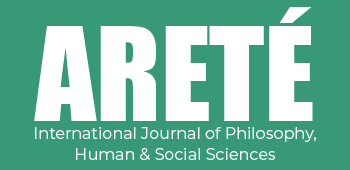The submitted articles should include a brief curriculum of the author and should be addressed to the Editorial Office of Areté in Word or PDF Format:
aretejournal@unimarconi.it
s.fortuna@unimarconi.it
a.gentile@unimarconi.it
t.valentini@unimarconi.it
The Editorial Staff will submit these files to the blind referees and inform the author within a month, in writing, whether the article has been accepted for publication.
All submitted works (papers, articles, and reviews) must be unpublished and must not have been simultaneously submitted to other journals for evaluation. Every article must be accompanied by both a brief English abstract and four or five English keywords.
The length of Studies (Studi) should not exceed 80,000 characters including keywords, abstract, spaces and footnotes. Notes (Note) submissions are limited to 40,000 characters, including keywords, abstract, spaces and footnotes. The author’s name should immediately follow the title, along with a note containing the author’s email, full address, and academic institution. Both the Studies and Notes must be divided into paragraphs with Arabic numerals and subtitles. All notes must be formatted as footnotes, not endnotes.
Studies must include a summary that reflects the divisions of the work in addition to the abstract. In the Notes, the summary is not strictly necessary.
System of Scientific Quotations in footnotes or in final bibliography
a) for books:
I. James, The New French Philosophy, Polity Press, Cambridge (UK) – Malden (USA) 2012, p. 39-40.
b) for collaborations in collective works:
D. Cornell, The Ethical Message of Negative Dialectics, in W. Brogan & J. Risser (Edited by), American Continental Philosophy. A Reader, Indiana University Press, Bloomington, IN 2000, p. 147-175.
The same concerns the books and the papers in German or in other languages. For example:
T. Valentini, Determinismus der Natur und Freiheit des Geistes. Die Rezeption Fichtes in Frankreich und die Ursprünge des französischen Spiritualismus, in H. Girndt (a cura di), „Natur“ in der Transzendentalphilosophie. Eine Tagung zum Gedenken an Reinhard Lauth, Band II, Duncker & Humblot, Berlin 2015, p. 373-406.
c) for journal articles:
A. Gentile, Critical Mind and Creative Intelligence, «Q-Times Webmagazine», 4, 2015, p. 1-9.
When a work is quoted more than once in an article, it should be written as follows: A. Gentile, op. cit., p. 8; or, if the title is repeated, A. Gentile, Critical Mind and Creative Intelligence, cit., p. 8.
When the work is already quoted in previous footnotes, it is sufficient to write ibidem with the number of page. For example:
Footnote n. 15) N. Stanlick, American Philosophy, Routledge, London and New York 2013, p. 33.
Footnote n. 16) Ibidem, p. 34.
Please note. For the papers in English language it is possible to quote according to the traditional scientific system of English-speaking countries, i.e. with the entire Bibliography/References at the end of the article (in alphabetical order).
Quotations occurring within another quotation should be indicated using a different sign (“text”) from the one that defines the text and contains the quote («text»). Words in languages different from that used in the main text should be written in italics, without quotation marks.
Book Reviews should not exceed 12,000 characters including spaces. Footnotes should be avoided. The book author’s proper name should be written in full. The name of the reviewer should be written at the end. For example:
David West, Continental Philosophy. An Introducion, Polity Press, Cambridge (UK) – Malden (USA) 2010, p. 354.
How to quote Areté Journal’s papers:
C. Piché, Kant et les conditions «conditionnées» de la possibilité de l’expérience, «Areté. International Journal of Philosophy, Human & Social Sciences», vol. 2, 2017, pp. 12-26.

